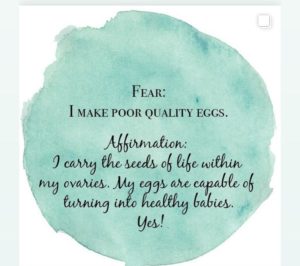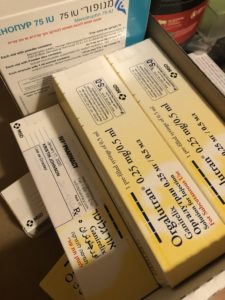A friend of mine recently had a baby that was conceived via IVF. She has been a HUGE resource for me in this whole journey. I don’t think I’d have been able to get through it without her, although I am quite sure she is so tired of me sending her annoying text messages about plastic and gluten.
She went to the world-famous clinic in Colorado that Bill & Giuliana Rancic went to. They are well known because they have great success rates and they also do tons of research themselves. They are worth their cost.
But thankfully for me, I am lucky to get some of her knowledge from them without having to go there!
One of the things she sent me back in April of last year was the supplement protocol that the CCRM patients are on. Up until this point, I didn’t know ANYTHING about supplements and how they could help. It was basically this list she sent and the copy of the It Starts with the Egg book that got me started.
The biggest one is CoQ10. Or as the ladies on the Big Fat Negative podcast like to call it – COCK TEN. This is naturally occurring substance in your body, but there is a lot of evidence that supplementing with more of it can help with egg quality. And at the ripe old age of 42, I need all the egg quality help I can get.

Image credit: @OfficialSaskiaRoell
My doctor told me to take it too, but the CCRM folks want you to take more per day than most doctors suggest. And because it isn’t harmful, I just load up my body on all the COCK TEN I can. Give me all the COCK!
When I started taking it, because I’m cheap and was living with a jobless liar and money was tight, I chose the cheapest version. After reading more about it and listening to more podcasts, I realized that taking the cheaper, ubiquinone version was not as good as the ubiquinol version of it. The ubiquinol is absorbed more easily and is in its active form, so it is an antioxidant, which is good. Your body has to convert ubiquinone into the active form, which apparently gets harder to do as one ages. So basically I switched from one to the other in July or August of last year.
The book (and my doctor) recommends 400 mg per day. But CCRM says 400 mg twice per day, so 800 mg total. So that’s what I do. I do 400 in the morning and 400 in the evening. I do Subscribe & Save for almost all my supplements. I use this CoQ10.
What I’ve learned from my reading and podcast listening, is that antioxidants are key. Oxidative stress is bad for your cells and your body, and especially bad for your eggs and reproductive system. So the key with these supplements is lots of stuff to counteract oxidative stress. Or something. (I should have probably said this before that I am not a doctor, nor do I play one on TV, so please take all my assvice with a grain of salt. This is what I am doing and my doctor knows everything I’m on and has no concerns.)
Other supplements I’m taking, based on advice of people I know and the internet and podcasts:
- Vitamin C – 500 mg a day – another antioxidant
- DHA (Omega 3 Fatty Acids) – 1000 mg/day – this is good for reducing inflammation and then is also good for the baby once you get pregnant
- Freeze-Dried Acai – 1000mg/day – there was a study at CCRM that this helped people who did IVF. I started taking it before I even knew I would move to IVF because I figured another super-power antioxidant can’t hurt. The study is still active and they use their own brand of the supplement, but Google tells me that they used this one before, so that’s the one I use.
- Bone Builder – One of the podcasts I listen to said that every woman trying to conceive and that are pregnant should take a supplement, usually labeled as a bone quality supplement, with a combination of Vitamin D, Vitamin K2, Calcium and Magnesium. They are all important nutrients and they are also ones your future fetus is going to suck right out of you from the very start, so it’s good to have plenty of them. I also broke a lot of bones as a kid and really didn’t like milk until I got older, so I need all of these nutrients as I can get, especially as I get older. I use this one.
- Choline – There has been a lot of recent studies on choline and that it is super important for babies and the current recommended dosage isn’t enough. So I’ve been supplementing with it because I want to help this future baby as much as I can and I don’t get enough through food. I use this one which was recommended on a podcast. It also has inositol in it, which is recommended for women who have PCOS (which I don’t), but it is a part of the B vitamin family, so it isn’t harmful. And it can help reduce the risk of gestational diabetes, which I’m at a higher risk of because of my age.
- Probiotic – There is some research that probiotics help in pregnancy and with fertility. There are lots of the good live bacteria in the reproductive organs, and this just helps keep things all in line. Or something. This article gives a lot more information on it.
- Vitamin D3 – Vitamin D is a huge thing in fertility. A lot of women in general, especially those of us in the colder climates, don’t get nearly enough. I’ve always had very low levels of Vitamin D. Turns out that can be a reason why a woman can’t get pregnant. So I’m supplementing and my levels have been really good the last few times I’ve been tested. So I’m just staying the course. I use these liquid drops, which are a higher dose of Vitamin D3 and bonus, there are a ton of servings in this little bottle! You just need one drop a day. Also, it kind of tastes like olive oil, FYI.
- Baby aspirin – I admit, this one I found on message boards on The Bump or something, and have since seen it on all the FB groups I’m in. The idea is that it helps with inflammation, which is a running theme of things we DON’T want when trying for a baby. It’s prescribed a lot for women who have had miscarriages. It’s also supposedly good for blood flow to the uterus and can help make the lining thicker, hence making implantation better. The CCRM handout says to add in Vitamin E too to all of this, but Vitamin E and baby aspirin do similar things, so they say don’t take both. For me, my first IUI, I was taking baby aspirin and my lining was really good at the insemination time. For the second one, I switched to Vitamin E and my lining was much thinner. So I stick with the Baby Aspirin until someone tells me to stop.
- Prenatal vitamin – I have been taking a prenatal for three years now! I take this one because it’s got iron and DHA. It has folic acid instead of methyl folate, which is the unprocessed form of folic acid. That is why I take a small methyl folate supplement in addition to the prenatal vitamin. The minimum they recommend is 800 mg of folic acid a day, which is what my prenatal has. But the body processes it differently than the pure form of methyl-folate. So it’s kind of like the CoQ10 situation where you may not be absorbing as much as is listed on the bottle, so I figure it cannot hurt to get some additional folate in my body. I also get this through food, so I’m not super concerned about not having enough for the little fetus. This is the one I take.
And now you can see why I needed to buy a special pill case that I can take with me for each day of the week, that separates my pills into AM and PM. My Sunday mornings are spent filling that bad boy up for the week ahead. I use this one because the pills I take are no small pills, so those teeny ones that only hold 2 pills wasn’t going to cut it.

All links are Amazon Affiliate links.
*Sung to the Destiny’s Child Classic – Bills, Bills, Bills







